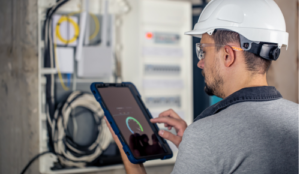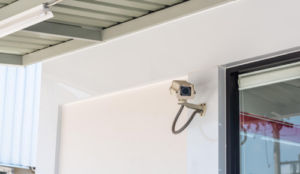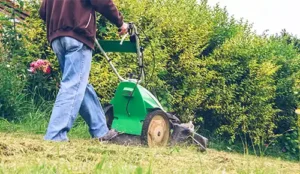Grounds maintenance activities like gardening and landscaping often require significant amounts of water, making it essential to utilise water-saving techniques to not only reduce usage and cut costs, but to support a sustainable future. Water is a finite resource, and with rising concerns over scarcity, conserving it wherever possible is increasingly important. By adopting water-saving techniques, you’re not only protecting the environment but also reducing long-term expenses.
What is an irrigation system?
An irrigation system is a controlled, automated solution designed to supply water to plants, landscapes, and sports fields, meaning plants receive consistent moisture, especially in regions with irregular rainfall patterns. They provide an effective way to support plant health and growth by delivering water at controlled intervals. Modern irrigation systems offer an efficient solution by delivering the right amount of water exactly when and where it’s needed, without a large investment.
Types of irrigation systems
There are various types of irrigation systems, each designed to address specific landscaping needs.
Sprinkler systems
Sprinkler systems are one of the most common types of irrigation systems, using fixed sprinkler heads to evenly cover large areas of land like lawns and sports fields. However, sprinklers can lead to water loss through evaporation and runoff if not carefully managed.
Drip irrigation
This system delivers water directly to plant roots through tubes or hoses, minimising evaporation and runoff. This system works best in garden beds and areas with a variety of plant species.
Surface irrigation
Surface irrigation systems involve flooding the ground, which can be less efficient in commercial settings. They can, however, deliver water below the surface, directly to plant roots, reducing water loss from evaporation.
Smart irrigation system
Smart irrigation systems are becoming increasingly popular, automatically adjusting watering schedules based on local weather and soil conditions. They’re an efficient choice for large landscapes and tech-driven projects
Why are efficient irrigation systems so important?
Irrigation systems are a useful tool, but only when operating efficiently. An efficient irrigation system will minimise water usage, helping to reduce both operational costs and environmental impact.
Water conservation:
Water conservation in gardens is critical for both environmental and financial reasons. You can significantly cut water use by following some simple steps:
- Spray irrigation systems cause high levels of evaporation so set your irrigation system to operate first thing in the morning before the air temperature has risen.
- Check the weather to see if it is likely to be raining the next day and switch off any automatic sprinkler or irrigation systems to save water.
- When replacing plants or flowers, look for varieties that require less watering and ensure the soil is properly cultivated to improve the structure and water-retaining properties of the soil.
Lower operational costs:
Efficient irrigation reduces water bills and minimises labour requirements by automating watering schedules, allowing maintenance teams to focus on other important tasks
Healthier plants and landscapes:
Proper irrigation encourages deeper root growth and improves plant health. By supplying water directly to the root zones, plants receive consistent moisture without the risk of overwatering.
Best practices for water-efficient grounds maintenance
To maximise your efficiency, regular maintenance and inspections are crucial. Our Grounds Maintenance teams can help look for issues like leaks, clogged sprinklers, or misaligned sprinkler heads, which can reduce system performance. Seasonal changes also affect watering needs, as plants typically require less water during the cooler months and more during hot dry periods. Choosing native or drought-resistant plants for landscaping minimises water requirements, as these plants can thrive with minimal irrigation. Combining efficient systems with water-wise plant choices allows groundskeepers to maintain lush, attractive landscapes all year round while using less water.
Efficient irrigation systems are crucial for sustainable grounds maintenance, offering solutions that not only conserve water but also promote healthier plants and landscapes. By leveraging technology and following best practices, you can achieve amazing landscapes whilst being environmentally responsible.
Water saving techniques
In addition to plant selection and irrigation systems, there are other techniques that can further enhance water conservation in your garden. Implement these water-saving techniques to reduce your reliance on public water supplies.
Mulching
Adding a layer of organic mulch around plants serves multiple purposes; it helps to keep moisture in the soil, minimises weed growth and stabilises soil temperature. By reducing the amount of water lost to evaporation, mulching allows plants to access moisture more effectively, cutting down the need for frequent watering.
Smart watering techniques
To conserve water and support plant health, it’s essential to adopt smart watering practices. Watering deeply but less often promotes the development of strong, deep roots. Choosing to water in the early morning or late evening minimises evaporation, ensuring plants receive the most benefit. Avoid excessive watering, as this can cause issues like root rot and other plant health problems.
Rainwater collection
Using rainwater is a simple yet effective water-saving approach, setting up rain barrels or a rainwater wash harvesting system to capture runoff from rooftops provides a valuable, eco-friendly resource. This collected rainwater can be used to hydrate your garden during dry spells, lowering your dependency on public water sources.
How to maintain a water-smart garden
Regular inspections and maintenance
It is important to periodically inspect your irrigation system for leaks, clogs or inefficient water distribution. Be sure to repair any issues promptly to prevent water wastage and regularly check your plants for signs of overwatering or underwatering and make the necessary adjustments.
Adjusting irrigation seasonally
Adjust your watering schedule according to seasonal variations in weather and plant needs. Being flexible with your irrigation systems and aligning with the current weather conditions helps ensure optimal water usage throughout the year.
How Dependable can help
If you’re looking to improve your water use efficiency, then irrigation systems are a great way to regulate it. Adopting sustainable water conservation practices can help you save money and carry out more environmentally friendly grounds maintenance! Get in touch with us to find out how we can help!




